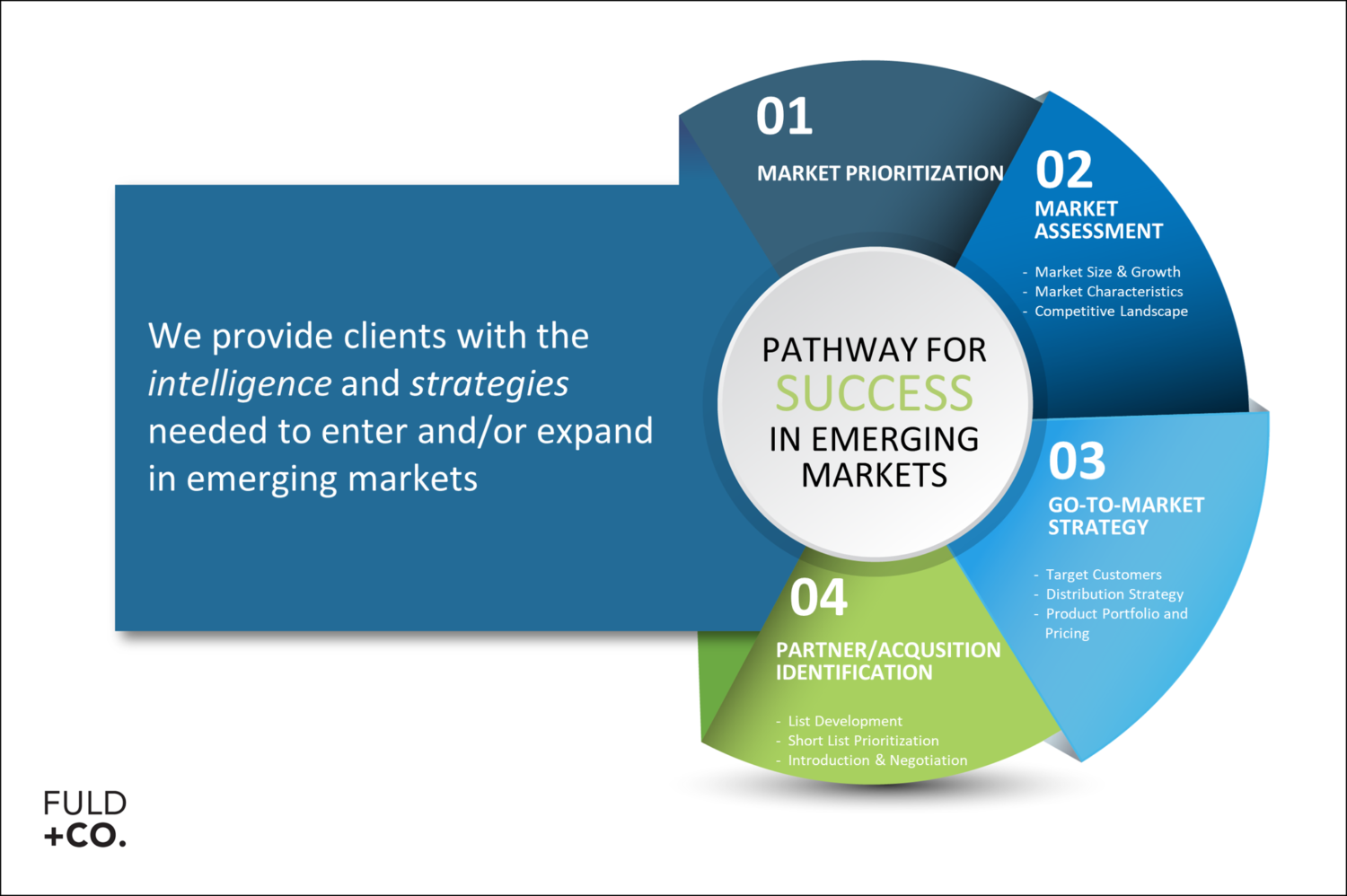Market Intelligence for Emerging Markets
Posted by | Fuld & Company
Why is market intelligence important?
Market intelligence is important for any company – whether that company is seeking growth or just working to maintain share. Markets are dynamic and any number of asymmetric and unknown forces can be at play. Typically, clients are looking for market insight when they are about to make an investment, forge a partnership or change their go-to market strategy. Clients need an outside perspective because they either lack the necessary insight from internal resources or are afraid they are so deeply entrenched in their own cognitive biases and perspectives that they cannot evaluate the market objectively.
When it comes to emerging markets, the questions are more obvious, e.g., What is the size of the market? What is the best route to market? etc., but these questions can seem overwhelming in some cases because you are starting from zero. While in the US, you may have spent decades refining your knowledge of the market, when it comes to emerging regions like China, India or Africa you can’t take the fundamentals for granted as there is sure to be different regulations, sources of funding, customer types, technology standards and uses for your product that are unique to a specific region, and syndicated research simply does not exist.
Why do companies partner with an outside firm for market intelligence?
The top reasons most companies partner with an outside firm particularly when it comes to understanding an opportunity in an emerging market can be summarized by the following:
- Lack of local presence— because the company hasn’t established business in that region they have no sources on the ground.
- General hesitancy or lack of confidence in their ability to organize, conduct and analyze results from their research — more times than not firms do not have the expertise to know where to even begin designing and executing such an approach.
- Lack of familiarity with markets and segments within developing nations — often very little understanding of the economics and market dynamics which shape these markets.
- Lack of resources — there aren’t enough internal people to lead such an engagement or spend time entrenched in those markets to gather specific and substantive insight.
Clients come to Fuld & Company at various stages of inquiry and/or investment in a new market. We can help anywhere from prioritizing potential new markets to identifying and vetting partners and/or M&A targets (see below diagram to understand typical approach to entering emerging markets).

An example of Fuld’s work in this space
First and foremost, in order to deliver the most accurate and comprehensive view, we try to find ways to immerse ourselves in these markets, whether they are defined as a new geographic market, industrial market or product category. We will travel to the center of these markets and conduct field research talking to key stakeholders buying the products or services, and/or visiting the key manufacturing and distribution centers.
For example, one of our global CPG clients wanted to understand if the Chinese manufacturing model was changing for a specific product category. In particular, they were concerned the industry in China was consolidating and as a result, Chinese players, who traditionally had been highly fragmented would achieve scale and have the capital to invest in innovation and ultimately develop more competitive products. Fuld & Company worked with our client to identify and track leading as well as lagging indicators of consolidation. For example, we mapped the profitability of different players over time to the point where they became too unprofitable to survive without consolidation. To conduct this analysis, we spent three weeks on the ground in China speaking to participants up and down the supply chain regarding their businesses and the future of the industry. This perspective and real-time shift in the industry could only be captured through a primary source research approach.
Generally speaking, we are seeking such perspectives, as well as source documents. We go to the primary sources because they contain the most valuable information, and can provide a great deal of context. A consultant can easily digest a piece of data, like a price point, but without understanding market dynamics first-hand it’s impossible to rigorously evaluate its meaning. Selecting the right research or methodological tool depends on the question at hand. In some cases, in-depth interviews are sufficient, in other cases in-situ observations or analysis of geo-spatial data is also needed.
Some of the most common questions we hear from clients
In terms of emerging markets, we hear similar questions across different industries, such as:
- Is this an attractive market? What is the size of the market? This is interesting to me because the first thing clients want to know is about the size of the market, but ideally it should only be asked or considered in the context of whether or not it is also a good fit for our strategy and resources.
- Is the economy growing in this market? This is of course relevant, but never should be considered in a vacuum. For example, if you are a consumer-based company, economic growth cannot be considered without also looking at the country’s demographics. The economy might be large and growing, but it is of little relevance to you if it is all being generated via oil and most of the proceeds are being siphoned off by the government or foreign companies.
- Do we have the right product for this marketplace? To answer this, we might first test the assumption that we can only bring in a product we already have. Do we have the resources and flexibility to introduce something better suited for the market? Who is currently in the market and what positions do they hold? Who or what is shaping the need for the product? Is this category well developed or do we have to spend money developing it? Where do our customers reside?
In essence, we’re looking to prioritize international opportunities for our clients and paint a clearer picture before offering a conclusion regarding if the emerging market is the right fit and presents the best opportunity among possible others for that specific company.
To learn more about how Fuld & Company can help you assess potential markets for growth , please contact us here.
Tags: Africa, Asia, China, Competitive Intelligence, Competitive Strategy, Consumer Products & Retail, Emerging Markets, India, Market Insights, Market Intelligence, Market Sizing, New Entrant Strategy, New Market Entry



















